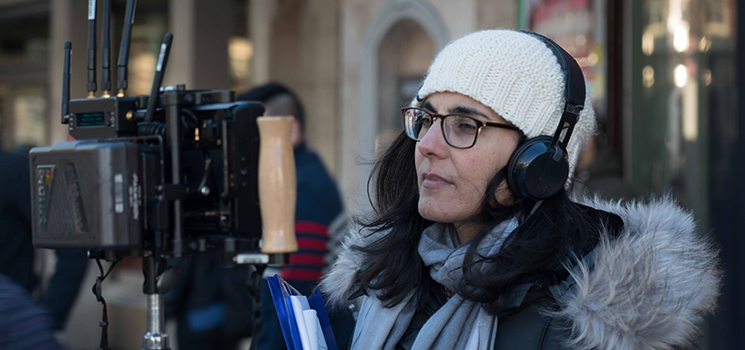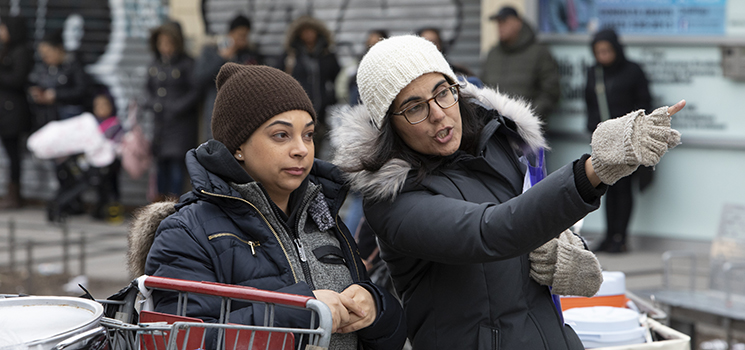News

A chat with Zahida Pirani, graduate filmmaker and Princess Grace award winner
By Noela Hueso
Zahida Pirani believes in telling the stories of those whose voices are not often heard. It’s something that comes naturally to the UCLA School of Theater, Film and Television graduate directing student: Before deciding to become a filmmaker, she spent 15 years as a community organizer in New York advocating for immigrant and worker rights. A first-generation Indian American raised in a working-class Mexican-American neighborhood in Escondido, Calif., Pirani learned to speak Spanish “more fluently than my parents’ language,” she says, and put those skills to good use when she wrote and directed El Carrito, a Spanish-language short film about the plight of a Mexican street vendor in Queens, New York, whose cart is stolen. The film was selected by a blue ribbon panel of industry professionals for the UCLA TFT Film Festival’s Directors Spotlight event this past year and is one of the reasons she was recently named a Princess Grace Foundation Award winner who will be celebrated during the foundation’s upcoming virtual summit, Sept. 20-22.
From her home office in New York, the bi-coastal Pirani recently chatted about her work as a community organizer, her burgeoning filmmaking career and her award.
What prompted you to go from being a community organizer to becoming a filmmaker?
Zahida Pirani: In community organizing, part of the work is helping people tell their own stories. As an organizer, I learned how to shape the experiences of our members’ lives into narratives that wide audiences could relate to and empathize with. One day, I took a New York Times reporter out to meet and interview undocumented livery cab drivers who were about to lose their driver’s licenses. I noticed that the reporter was captivated by the details of their circumstances and thought to myself, “these stories should be made into movies.” As a filmmaker, I'm telling the stories of people who are not often represented on the screen to build awareness and understanding just like I did as an organizer. I bring a lot of my values and the way we work in community organizing to my set as well.
How so?
A core principle in organizing is to intentionally give leadership roles to people who may not have traditional experience so that they can develop skills through practice. For El Carrito, I gave leadership roles to people in the community who had never worked on a film before, and who I knew could uniquely contribute to telling this story. My production designer, for example, works with a city-wide street vendor organization. She did amazing work. It looks so real because she knows that world. She connected with vendors and got them involved as consultants. One of my co-producers lives in the neighborhood where we shot and also comes from a community organizing background. The lead actor, Eli Zavala, worked with one of the street vendors in preparation for the role and sold tamales with her. There are also some non-actors in the film. All of these community collaborations brought a sense of realism to the story we were telling.
There are some similarities between El Carrito and your first film, the documentary Judith: Portrait of a Street Vendor. Is Nelly, your protagonist in El Carrito, based on Judith?
It's not exactly Judith’s story but it’s her reality and those of many other street vendors. In the documentary Judith talks about people stealing carts. I thought it would be interesting to create a narrative film where the cart is actually stolen. What would a vendor do in this situation and how does she grow as person?

You say in your directors’ statement that “El Carrito is about community and solidarity in a culture that often prioritizes competition.” Why is that an important story to tell?
It goes back to my bigger vision as a filmmaker — to challenge the notion of the American Dream and to create immigrant narratives and stories that go beyond that. I grew up in an immigrant family and have been surrounded by working-class immigrants my entire life. I have seen how exclusive and unattainable the American Dream can be. This can sometimes put more value on individuality and competition rather than community and collaboration.
Does Nelly ascribe to the notion of the American Dream?
Nelly does have that hustle attitude; she’s all about “I need to get my piece of the pie” but that can be isolating because she’s doing everything on her own.
Through her experiences, she learns that there is another way to go about things.
Yes. Organizing has taught me that there is so much value and worth in building community and that it is such an important part of the immigrant experience that doesn't get portrayed. I see it in my community all the time: There is this higher moral code that people adhere to — this attitude of "it doesn't matter if you're undocumented, it doesn't matter if you're working class, we're all in this together." There’s a sense of "we have each other’s back even though we may not know each other." All that is shown in the film.
I loved how you used sound in El Carrito. There wasn't a soundtrack, you just used the resonance of the city.
Yeah, that was very, very purposeful. A lot of the filmmakers I love don't have music in their films and I was really excited to play with that. It was really important to me that Nelly’s emotional states were telegraphed through the ambient sounds. For example, when she’s enraged by seeing another vendor with what she thinks is her cart, you hear a jackhammer in the background.
Let’s talk about the Princess Grace Award.
I first heard about it a couple of years ago and was really inspired to apply because of their emphasis on artistry and growth of emerging filmmakers. I also really appreciated how they were intentional about fostering community across artistic disciplines. The award also comes with a $10,000 grant, which was another reason I applied. Once you're in the Princess Grace family, they are there to support you throughout your development with various programs and there’s also potential to get funding in the future. What’s great, too, is that a lot of Princess Grace alumni have gone on to be very successful in their careers. It’s really such an honor to be part of this group.
What is the application process like?
You have to be nominated. First you fill out an application and submit an artist statement to the TFT faculty committee involved in the process. One of them makes the official nomination and both the nominator and another faculty member write letters of recommendation. That’s the whole package for the first round. The Princess Grace Foundation let me know that I made it to the second round and asked for work samples. Then I had to turn in another statement where I talked about how my contribution as a director is unique and a second artist statement. They’re looking for people who have thought deeply about their artistry and who have a vision for how they want to change things in the industry. I talked about my community organizing experience and the kinds of stories I want to tell.

How did you react upon learning you were a winner?
I was very emotional! As a filmmaker who is telling the types of stories I am, it can be a difficult journey that includes rejection. Winning this award has given me the encouragement to stay true to my art and to continue telling the types of stories I want to tell. To know that there is this amazing institution that wants to be part of my growth as an artist means a lot. I feel even more sure about staying on the path of storytelling that I’ve chosen.
How will you use your prize money?
The money will be used for my thesis film, which I will be shooting next year.
What is that story about?
Ahmed is about a recent Bangladeshi immigrant, Sudipto, and his philosopher-type friend, Ahmed. Ahmed is a mentor to Sudipto and teaches him how to uphold one’s humanistic values in the dog-eat-dog culture they inhabit working for a livery cab company. In the process, Sudipto learns how to get in touch with an authentic self that breaks away from tradition and societal norms. I explore themes in Ahmed that are similar to those in El Carrito: subverting the American Dream and retaining one’s humanity in a world that often feels very hard and competitive.
Do you have any other projects in the works?
I’m planning on developing Ahmed into a feature script that I can shoot after I graduate. I’m also writing a feature script right now about a Pakistani man in New York City who becomes an FBI informant and is forced to entrap his best friend's son. I want to continue capturing the stories of people I’ve known throughout my life, to reveal our common struggles as human beings and to show the beauty and contradictions of our lives.

Photos: (From top) Zahida Pirani on the set of El Carrito; actress Eli Zavala pushes her cart in a scene from the film;
Pirani directs Youlin Luna, one of the non-actors from the community where El Carrito was made.
Credits: Tanbir Haque (top); Salvador Espinoza (middle and bottom)

Posted: September 7, 2021





